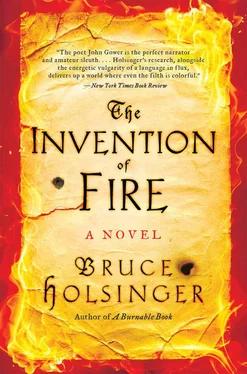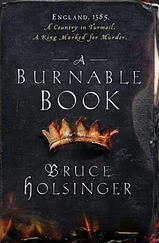Bruce Holsinger - The Invention of Fire
Здесь есть возможность читать онлайн «Bruce Holsinger - The Invention of Fire» — ознакомительный отрывок электронной книги совершенно бесплатно, а после прочтения отрывка купить полную версию. В некоторых случаях можно слушать аудио, скачать через торрент в формате fb2 и присутствует краткое содержание. Год выпуска: 2015, Издательство: HarperCollins, Жанр: Исторический детектив, на английском языке. Описание произведения, (предисловие) а так же отзывы посетителей доступны на портале библиотеки ЛибКат.
- Название:The Invention of Fire
- Автор:
- Издательство:HarperCollins
- Жанр:
- Год:2015
- ISBN:нет данных
- Рейтинг книги:3 / 5. Голосов: 1
-
Избранное:Добавить в избранное
- Отзывы:
-
Ваша оценка:
- 60
- 1
- 2
- 3
- 4
- 5
The Invention of Fire: краткое содержание, описание и аннотация
Предлагаем к чтению аннотацию, описание, краткое содержание или предисловие (зависит от того, что написал сам автор книги «The Invention of Fire»). Если вы не нашли необходимую информацию о книге — напишите в комментариях, мы постараемся отыскать её.
The Invention of Fire — читать онлайн ознакомительный отрывок
Ниже представлен текст книги, разбитый по страницам. Система сохранения места последней прочитанной страницы, позволяет с удобством читать онлайн бесплатно книгу «The Invention of Fire», без необходимости каждый раз заново искать на чём Вы остановились. Поставьте закладку, и сможете в любой момент перейти на страницу, на которой закончили чтение.
Интервал:
Закладка:
“A tale of Melibee and his Dame Prudence,” he said. “It’s a little thing in prose, a translation from a certain Renaud. A mirror for princes about the virtue of good counsel. I started translating it a few weeks ago and could not stop myself from finishing. It fits this season of corruption in Westminster particularly well, I think. False soothsayers, advisers who keep mum when they should speak the truth, young men who cry ‘War!’ the loudest, yet know the least about it.”
“True enough,” I said, taking the booklet from him and noting the unique look of the scribe’s hand. “Is this Pinkhurst’s work?”
“It is,” Chaucer said. “He is back in town, you know. He’s promised me he will help you in any way he can. He is awaiting your visit at the Guildhall with warmth and fair welcome.”
“I thank you, Geoffrey.”
“It’s nothing.”
“And who will narrate this little thing?” I said, paging through, though it was hardly brief. The tale of Melibee covered the entire quire, leaving off only at the end of the sixteenth leaf.
“The tale will be told by . . . well, by me, in fact.”
“By you?” I glanced up from the booklet. “You are to be a character, then, in your own pilgrimage tale?”
He looked offended. “There are precedents, and much grander ones. Dante Alighieri casts himself as a visitor to heaven and hell. Surely Geoffrey Chaucer can imagine himself on a short journey to Canterbury. And who is this?”
His head turned. Jack Norris had slipped into the hall. The boy stopped when he saw Chaucer. His head was uncapped, his stubs clearly visible beneath his messy shock of blond hair.
“This is an honored guest of the priory. Jack is his name.”
Jack bowed to Chaucer, who nodded back, looking both troubled and amused.
“A story for another occasion,” I said as Jack dodged out.
Chaucer rose from his chair. “You are a man of peculiar alliances and loyalties, John. I hope you will find space to return to your own making in due time.”
“As do I, Geoffrey,” I said, silently forgiving him his small blindness.
“You cannot simply stay here in the priory, burrowed in like a hibernating bear,” he urged me. “Yet you need protection. I don’t want you to end up one of these factional men knifed in the street.”
“You warned me that first day, didn’t you?” I stood to walk him to the door. “Yet I meddled in this mess, and now I’m paying the price for my curiosity.”
“Not quite the right word for your craft, John,” Chaucer said with his elvish smile.
He left for Greenwich and I remained in the hall, puzzling it all out. A splinter company of English soldiers, armed with these new handgonnes, commits two atrocities and now surely plots a third. The first, a massacre in a Kentish wood, is a controlled slaughter with prisoners as its victims, the bodies hauled secretly to London for disposal in the privy channels. The second massacre takes place along the walls of Desurennes, a village in the Pale, a daytime assault on the unknowing population of a market town, the survivors left to fend for the dead and wounded themselves.
What next? With Lancaster abroad, Gloucester was the most powerful of the lords opposing the king, and the hungriest for war. Despite the extent and depth of his conspiracy, the duke himself remained free, untouched by the hand of justice. Gloucester carried both houses of Parliament in his palm, and I could see no way to avoid the reckoning that was surely coming.
Blindness, Christ tells us in Scripture, comes in many forms. “For judgment I came into this world, that those who do not see may see, and those who see may become blind.” A paradox, one to which I had clung like a vine to a wall since first experiencing my own earliest failures of vision. Where shall my soul find solace when my flesh falters and quits? What inner sight shall I be granted once my outer sight fully abandons me?
A man going slowly blind builds up too much confidence in his other senses. Touch, taste, smell, hearing: all grow more acute up to a certain point, and yet one’s thoughts inevitably dull somewhat, as the power of intellection wanes with the diminution of sight, the first and most primal of our worldly senses. As the eyes go, so goes the mind.
My wife, perhaps a month before her death, told me about the strange pleasure she first took in my eyes. We had been married already for over a year, with our first child four months from birth. Nothing like love had been felt or spoken between us, not yet. Ours was a marriage of families in pursuit of an heir, with love and lust no matter to all concerned. Yet in those middle months of her first affliction our attraction grew suddenly keen. Ignoring the stern injunctions against meddling with a pregnant wife, I sought out her flesh at every opportunity.
One morning we found ourselves coupling in the glare of a summer sun, which flooded our bedchamber with an almost heavenly fullness. I would like to think I remember that morning myself, though I cannot honestly say this is true. Yet what her memory took most clearly from that day, she told me all those years later, was the verdant intensity of my eyes, an unworldly green blazing down as I moved above her.
“You always had the keenest eyes, John,” she said to me with one of her infrequent smiles in those final weeks. “The eyes of a hawk, able to sort wheat and chaff from a mountaintop.”
Now I have the eyes of a mole, I thought, tunneling along, mouthing in all before me without sifting the soil for the worm. The blind, it is said, eat many a fly.
Chapter 38
A widow with a great babe in her greater belly: not an everyday sight at the Tower of London, and Hawisia was relying on the strangeness of it, and the silver in her purse, to get her an ear at the barbican. She left the foundry along Bellyeter Lane, walked down through the ward to Tower Street, and now stood by the entrance to the outer gatehouse, on the city side of this sprawling network of keeps, walkways, and bristling arms. The warden, summoned from his room above, regarded her as she stood within the King’s Lip, the covered court before the barbican door. A thickset man, with a massive black beard spread across his doublet, sleeves of beaten iron clasped at his forearms.
“Want to speak with one of our wardrobe men, do you?” he said gruffly.
“Aye, that’s it,” Hawisia replied. “Name’s Stephen Marsh.”
“His office?”
“Makes guns.”
The warden looked at one of the guards. “Snell’s crew, then.”
“I’ll send the page?” the guard said.
“Do that,” said the warden. The guard went in.
“Come along.” The warden gestured her forward, and she stepped along the path to the barbican, the first time she had ever set foot within the great royal compound. Once they were in the tower the warden pointed to a half-moon wooden bench stretching along the wall from the causeway door to another opening that gave onto a staircase. She took the portion of the bench nearest the descending stairs, feeling the movements of her coming child within her. A kick. A squirm. Another kick.
The ceiling sat low over the windowless chamber, which was heavy with smoke and the sharp scent of dung and straw from the many boots treaded across the uncovered floor. Though only slits lined the walls, letting in little light, she could hear a general racket from out and over the moat channel, the music of coming war. The neighing of horses, the shouts of troops, the pounding of hammers on metal. From beneath and above her in the same tower she heard other, stranger noises, the screeches and trumpets of foreign beasts in the king’s menagerie. Hawisia had no interest in such creatures, though their rare clamor chilled her skin.
Читать дальшеИнтервал:
Закладка:
Похожие книги на «The Invention of Fire»
Представляем Вашему вниманию похожие книги на «The Invention of Fire» списком для выбора. Мы отобрали схожую по названию и смыслу литературу в надежде предоставить читателям больше вариантов отыскать новые, интересные, ещё непрочитанные произведения.
Обсуждение, отзывы о книге «The Invention of Fire» и просто собственные мнения читателей. Оставьте ваши комментарии, напишите, что Вы думаете о произведении, его смысле или главных героях. Укажите что конкретно понравилось, а что нет, и почему Вы так считаете.












